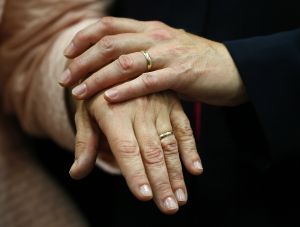Catholic parishes should welcome same-sex couples, Synod told

Catholic parishes should welcome same-sex couples, the synod of nearly 200 bishops on the family in Rome was told on its first full day of meetings.
Ron and Mavis Pirola, from Sydney, who are among of a small group of laity who will address the bishops and cardinals over the next two weeks, said: "The church constantly faces the tension of upholding the truth while expressing compassion and mercy. Families face this tension all the time.
"Take homosexuality as an example. Friends of ours were planning their Christmas family gathering when their gay son said he wanted to bring his partner home, too. They fully believed in the Church's teachings and they knew their grandchildren would see them welcome the son and his partner into the family. Their response could be summed up in three words, 'He's our son.' "
They continued: "What a model of evangelisation for parishes as they respond to similar situations in their neighbourhood."
The Catholic News Service reported the intervention from Rome, where Pope Francis has called the extraordinary synod in an attempt to help the Church find a way to deal with a world where its teachings on homosexuality, marriage and divorce and contraception are not only increasingly out of step with the world, but regarded as unjust by many. In a letter to bishops in 1986, the former Pope Benedict, then Cardinal Ratzinger, stated what remains the Church's official position, that homosexuality is "ordered towards an intrinsic moral evil, and thus the inclination itself must be seen as an objective disorder."
The Pope, who opened discussions, urged bishops to speak openly, without fear of upsetting him.
He said they had a "great responsibility" to bring the realities and problems of churches in the world to the synod.
Pope Francis said: "A general condition is this: speak out. Let no one say: 'This can not be said; think of me this way or that ...' You have to say everything that you feel with parrhesia (A Greek word meaning 'boldly')."
He revealed that after an earlier meeting this year on the topic of the family, a Cardinal wrote to him saying it was a pity that some Cardinals had not had the courage to say some things, out of respect his feelings of fearing that the Pope was thinking something different. "This is not good, this is not collegiality," the Pope said. "You have to say everything that the Lord feels you have to say, without human diffidence, without timidity. And, at the same time, you should listen with humility and accept with an open heart to what your brothers say. With these two attitudes is exercised collegiality.
"For this reason, I ask you, please, brothers in the Lord: speak with frankness and listen with humility. And do it with tranquility and peace."
Although there is a tangible sense among observers in Rome that there is a mood for change, it is unlikely to happen quickly. The Monday morning session, which was televised, saw many bishops argue against any changes to church teaching.
All future sessions will be behind closed doors, and summarised for accredited media at daily briefings in the Vatican press office.
At the end of the week, the bishops will draft a working document on the theme of evangelisation and the family. It will be finalised next week.











